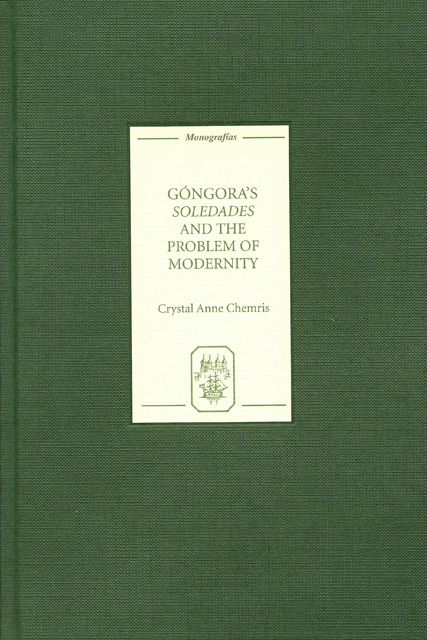Book contents
- Frontmatter
- Contents
- Dedication
- Foreword
- Acknowledgments
- Preface
- Introduction: Renaissance and Solitude
- 1 Crisis and Form
- 2 Violence, Eros and Lyric Emotion
- 3 Self and World: The Crisis of Perception in the Soledades
- 4 Time, Space and Apocalypse: The Falconry Scene as Disruption of Prophecy
- 5 Góngora and the Modern: “New Poetry”?
- Works Cited
- Index
1 - Crisis and Form
Published online by Cambridge University Press: 03 May 2023
- Frontmatter
- Contents
- Dedication
- Foreword
- Acknowledgments
- Preface
- Introduction: Renaissance and Solitude
- 1 Crisis and Form
- 2 Violence, Eros and Lyric Emotion
- 3 Self and World: The Crisis of Perception in the Soledades
- 4 Time, Space and Apocalypse: The Falconry Scene as Disruption of Prophecy
- 5 Góngora and the Modern: “New Poetry”?
- Works Cited
- Index
Summary
And new philosophy calls all in doubt,
The element of fire is quite put out;
The sun is lost, and the earth, and no man's wit
Can well direct him where to look for it.
And freely men confess that this world's spent,
When in the planets, and the firmament
They seek so many new; then see that this
Is crumbled out again to his atomies.
’Tis all in pieces, all coherence gone;
All just supply, and all relation.
John Donne, “Anatomy of the World” (1611)The Baroque culture which informed Góngora's creation of the Soledades represents a further development of the crisis at the origins of modernity. Severo Sarduy and Marjorie Nicolson relate the advances in astronomy in the early seventeenth century, such as Kepler's notion of elliptical orbits and the discovery of planetary imperfections revealed by the new optics, to a de-centered notion of the cosmos with broader epistemological implications (Sarduy, Barroco; Nicolson). The growth of the “new science” indeed represented a challenge to the established organization of knowledge. Europe experienced what Paul Hazard has termed a “crisis of consciousness,” foundering in a limbo between Platonism, as well as the earlier Scholastic-Aristotelian forms of knowledge, and the Rationalist view of the world. The notion that the phenomenal world can be measured against universal archetypes or essences is challenged as things begin to be evaluated in the light of experience and observation. Paolo Rossi describes this change in the progressive re-estimation of the mechanical arts. As he argues, the “sacerdotal conception of knowledge” based on notions of the arcane, eternal wisdom of the ancient auctores, the conception of nature as a “rigid hierarchy of forms”, begins to be displaced by an appreciation of knowledge as an historical construct, based on empirical skills which could be mastered, shared by all and systematized to continuously extend the cultural horizon (x, 15). This shift occurs as a gradual response to the needs of growing cities and commerce, to the requirements of navigation in the age of exploration, and to the military and technical demands of empire (see Rossi, especially 35–42).
- Type
- Chapter
- Information
- Góngora's Soledades and the Problem of Modernity , pp. 21 - 50Publisher: Boydell & BrewerPrint publication year: 2007



